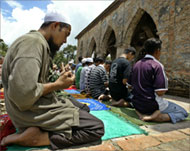Marginalised community demands justice
The crushing and suffocation of at least 78 Thai demonstrators is yet another crime that underlines Bangkok’s disregard for its Muslim minority, according to Muslim organisations in the southeast Asian country.

The Islamic Society of South Thailand (ISST) says these latest deaths come barely six months after government forces stormed a mosque in the southern province of Pattani and massacred 108 Muslims.
ISST Secretary-General Abd Allah Muin al-Din told Aljazeera.net on Tuesday that even the government’s former human rights commissioner has evidence that police have often killed Thai Muslim suspects after their arrest on dubious charges.
“But [Prime Minister Thaksin] Shinawatra has never accepted his own rights commissioner’s report. On the contrary, he defended their actions and refuses to investigate charges of security forces carrying out executions,” said Muin al-Din.
Context to troubles
With a 10% Muslim minority living mostly in the five southern provinces bordering Malaysia, Thailand is a predominantly Buddhist nation of about 60 million people.
Many southern inhabitants are also ethnic Malays who often speak a different language from their more northern Thai neighbours – a fact that has often led to a misunderstanding of what most Thai Muslims are actually asking for.
In three of those southern provinces – Yala, Pattani and Songkhla – Muslims predominate. The former sultanate of Pattani, which covered these provinces, is seen by some as the cradle of Islam in the region.
|
“All the Islamic movements I am in touch with crave stability, peace and calm – but with justice” Abd Allah Muin al-Din, |
“But the days when Thai Muslims were demanding independence or unification with Malaysia have gone – a message that does not seem to have reached Bangkok,” says Muin al-Din.
“At a grassroots level, all the Islamic movements I am in touch with crave stability, peace and calm – but with justice.”
Neglect
Muin al-Din believes that one of the many reasons for the instability in the south is the lack of government support or dialogue – a reality that has lead the Muslim minority to feel peace can never be achieved.
“Even before the latest electoral campaign, the prime minister was too busy to handle serious life-and-death issues that affect us.
“This has not changed since the elections and is detrimental to the region. We need the authorities to concentrate on matters of urgency,” he said.
But ISST does not speak for all Muslim movements in the south. Banned groups rule out dealing with Bangkok altogether.
Opposite view
The Pattani United Liberation Organisation (Pulo) has said that government policy toward the region over the past 30 years proves there is no genuine interest in addressing unpopular issues such as minority rights.
Pulo Vice-President Haji Luqman has no hesitation in blaming the unrest solely on the shoulders of “the Thaksin regime”.
A statement on the group’s website calls on governments from around the world to recognise the “ethnic cleansing” in the region, and vows to defend itself from brutal measures such as those demonstrated on Tuesday.
List of demands
Living in exile in Sweden, Luqman warns tourists about travelling to the region and says that the best thing the Thaksin “regime” could do would be to stop listening to nationalists who have no interest in peace.
 |
|
More than five million Muslims |
Elucidating on ethnic minority demands, Luqman explains that the government is going to have to recognise Thailand’s five million Muslims.
“They must recognise our language, culture and ethnicity and deal with the fact that the south is poorer than much of the rest of the country.”
He says until such a time as discrimination in the workplace ends and there are genuine opportunities for education and business, not much is going to change.
Hope for future?
But not all Muslims believe the situation is unlikely to improve in the near future. Last September, Muslim heads from different agencies and organisations met in south Thailand several times in the five Muslim southern provinces.
Sponsoring one such meeting in Narathiwat, local Muslim business man Wan Abdullah said peace could be achieved.
“While it is obvious that the Pulo is against negotiations, it is also clear that the Muslims are tired of being the target of constant raids and roadblocks as well as attacks by nationalists,” Wan said.
“Pulo is out of touch now; they should drop their independence demand and negotiate for a better deal for Muslims. South Thailand is a rich land all we really need is some investment funds to start long overdue projects.”
“That will help channel the Muslims towards progress and development and will also give them a sense of identity to their culture and region,” said Wan.
New policy needed
But theory and reality have proven to be two different things. Although Thaksin had promised in excess of $700 million in aid for the south, including the opening of an Islamic university in Narathiwat, results on the ground are few and far between.
|
“Muslims are tired of being the target of constant raids and road blocks as well as attacks by nationalists” Wan Abdullah, |
Last July, relations hit a new low when Bangkok threatened to shut down Muslim boarding schools -claiming they were used as training camps for separatists and possibly even Jemaah Islamiya, the organisation accused of the Jakarta and Bali bombings.
And deputy Prime Minister General Chavalit Yongchaiyudh has since confirmed that the government was considering cutting funding to some Islamic schools. “If they [teachers] have committed any damage to authority or security they must be prosecuted.”
Pulo and ISST may not agree on the means, but their objectives are the same: Government attitudes towards the south have to change.